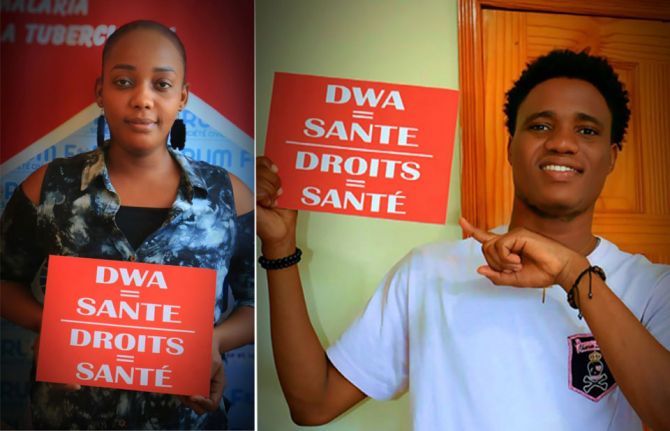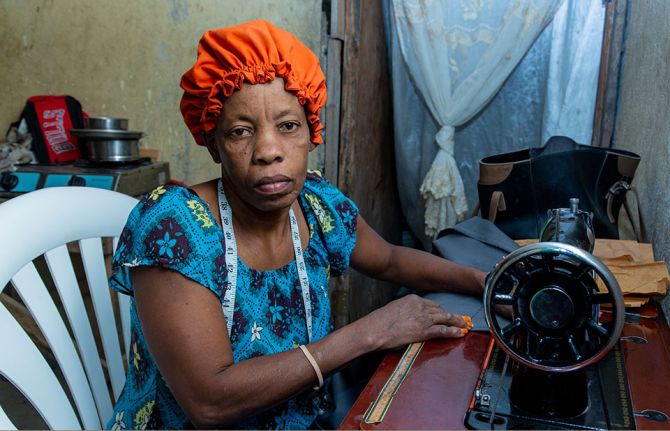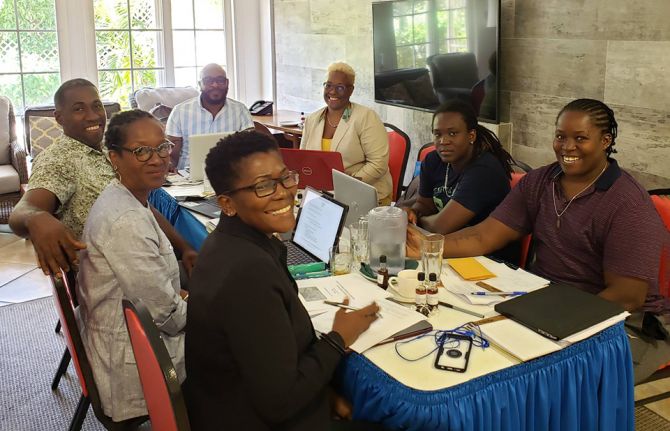unaids.org
UNAIDS


Prime Minister of Antigua and Barbuda, the
Honorable Winston Baldwin Spencer with UNAIDS
Deputy Executive Director, Michel Sidibe
AIDS has become the “greatest leadership challenge to nations and regions” in the 26 years since its discovery, the UNAIDS Deputy Executive Director UNAIDS Michel Sidibe said in his keynote speech at the 7th Annual General Meeting of the Pan Caribbean Partnership Against HIV/AIDS (PANCAP), held in Antigua and Barbuda (24 - 26 October).
Addressing some hundred participants, Sidibe said AIDS has become a defining issue of our time. “We are really in the turning point in my point of view. It is important for us to not to just deal with this pandemic like if it is just about managing a short term crisis, it is time for us to look at how we can really think about long term sustainable approach to deal with this pandemic,” he said.
In order to meet that challenge, Sidibe reinforced the urgent need for countries to turn commitments into action by setting and achieving targets for universal access to HIV prevention, treatment, care and support services for all those in need. Resonating strongly with the theme of the PANCAP meeting— Universal Access by 2010: Ensuring Success—the UNAIDS Deputy Executive Director maintained that the greatest legacy to future generations would be the attainment of this critical goal.
Taking into account new factors such as the increasing numbers of women becoming infected with HIV, growing stigma and discrimination, and the lack of capacity to get treatment to all those in need, Sidibe said action must be accelerated. “We need to quicken the pace of action,” he said.
Established in 2001, PANCAP is the regional mechanism responsible for coordinating the Caribbean’s response to the HIV epidemic. It is based in the Caribbean Community (CARICOM) Secretariat, in Georgetown, Guyana. The PANCAP Annual General Meeting is an important regional event in the Caribbean bringing together the principal leaders in the AIDS response in this Region.
Mr Sidibe, on his first trip to the Caribbean in his capacity as UNAIDS Deputy Executive Director and Under Secretary General of the UN, also met with various leaders and UNAIDS partners in the Caribbean region. These included: Prime Minister of Antigua and Barbuda, the Honorable Winston Baldwin Spencer, Antigua’s Minister of Health, John Maginley, Assistant Secretary General of CARICOM, Dr Edward Greene, Chairman of the Barbados National HIV/AIDS Commission and former Chair of the Global Fund, Dr Carol Jacobs, Belize AIDS Ambassador, Dolores Balderamos Garcia and Dr James St Catherine of the Organization of Eastern Caribbean States. Commending all for their exemplary leadership shown in working to expand the AIDS response and achieve universal access both nationally and regionally, Sidibe pledged increased UNAIDS technical support and assistance to further strengthen efforts.
The Caribbean region is the second most affected by AIDS after sub-Saharan Africa. An estimated 250,000 people are living with HIV in the region, more and more of them women. In 2006 there were 27,000 reported new HIV infections.
Links:
Visit the PANCAP web site
Visit the CARICOM web site

Feature Story
PANCAP: AIDS in the long-term
31 octobre 2007
31 octobre 2007 31 octobre 2007Prime Minister of Antigua and Barbuda, the Honorable Winston Baldwin Spencer with UNAIDS Deputy Exec...

Prime Minister of Antigua and Barbuda, the
Honorable Winston Baldwin Spencer with UNAIDS
Deputy Executive Director, Michel Sidibe
Addressing some hundred participants, Sidibe said AIDS has become a defining issue of our time. “We are really in the turning point in my point of view. It is important for us to not to just deal with this pandemic like if it is just about managing a short term crisis, it is time for us to look at how we can really think about long term sustainable approach to deal with this pandemic,” he said.
In order to meet that challenge, Sidibe reinforced the urgent need for countries to turn commitments into action by setting and achieving targets for universal access to HIV prevention, treatment, care and support services for all those in need. Resonating strongly with the theme of the PANCAP meeting— Universal Access by 2010: Ensuring Success—the UNAIDS Deputy Executive Director maintained that the greatest legacy to future generations would be the attainment of this critical goal.
Taking into account new factors such as the increasing numbers of women becoming infected with HIV, growing stigma and discrimination, and the lack of capacity to get treatment to all those in need, Sidibe said action must be accelerated. “We need to quicken the pace of action,” he said.
Established in 2001, PANCAP is the regional mechanism responsible for coordinating the Caribbean’s response to the HIV epidemic. It is based in the Caribbean Community (CARICOM) Secretariat, in Georgetown, Guyana. The PANCAP Annual General Meeting is an important regional event in the Caribbean bringing together the principal leaders in the AIDS response in this Region.
Mr Sidibe, on his first trip to the Caribbean in his capacity as UNAIDS Deputy Executive Director and Under Secretary General of the UN, also met with various leaders and UNAIDS partners in the Caribbean region. These included: Prime Minister of Antigua and Barbuda, the Honorable Winston Baldwin Spencer, Antigua’s Minister of Health, John Maginley, Assistant Secretary General of CARICOM, Dr Edward Greene, Chairman of the Barbados National HIV/AIDS Commission and former Chair of the Global Fund, Dr Carol Jacobs, Belize AIDS Ambassador, Dolores Balderamos Garcia and Dr James St Catherine of the Organization of Eastern Caribbean States. Commending all for their exemplary leadership shown in working to expand the AIDS response and achieve universal access both nationally and regionally, Sidibe pledged increased UNAIDS technical support and assistance to further strengthen efforts.
The Caribbean region is the second most affected by AIDS after sub-Saharan Africa. An estimated 250,000 people are living with HIV in the region, more and more of them women. In 2006 there were 27,000 reported new HIV infections.
Links:
Visit the PANCAP web site
Visit the CARICOM web site



